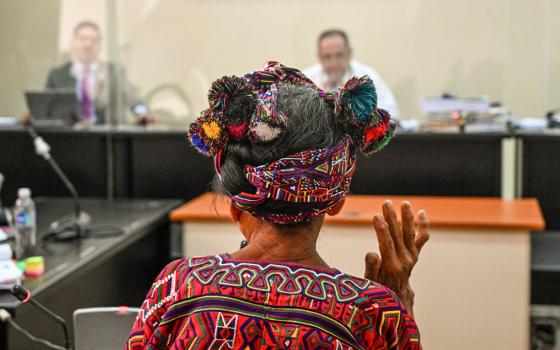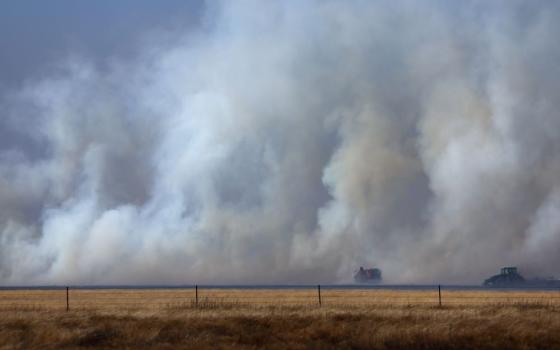I have resisted saying anything publicly about John Dear's exit from the Society of Jesus. I consider John a friend. I've broken bread with him, enjoyed his company on assignments, written about his work and invited him to speak at a parish where I was a member. I was the editor who invited him onto the NCR website because I thought his views and his critique of the culture, though I may not have seen eye to eye with every aspect of them, were valuable contributions to the Catholic conversation.
But I find myself at great odds -- and feeling increasingly uncomfortable about it -- with his assertion that the Jesuit order "no longer advocates for justice or works of justice." I don't know if his superior in Baltimore actually said that. It's a "he said, he said" situation and I have no way to verify the accuracy of the comment. The Jesuits, according to the reporting by my colleague Joshua J. McElwee, aren't talking. But I find the claim itself, whether that is an actual quote or not, utterly preposterous.
Whatever finally caused John and the Jesuits to part ways, I find the characterization of the order as having "renounced Fr. Arrupe's groundbreaking vision of justice" equally preposterous. I was hoping people would see these as the angry, one-sided version of events of a sad and unfortunate breakup a long time in the making. However, those characterizations of the order have morphed and been repeated and elaborated on and speculated upon by others. His claim that the Jesuits no longer do social justice work has evolved into a meme of the ether, popping up on blogs, Facebook postings and even NCR's website.
I have no intention here of being an apologist for the Jesuits. God knows, they've survived far worse in their nearly 530 years than a few angry assertions by a wounded member of the company. But in the instance that something so demonstrably false within the Catholic community becomes unquestioningly accepted and publicized, I feel an obligation to address the matter. You who have benefitted from being members of Jesuit parishes, where justice has been done in unusual and abundant ways; you students who have been inspired to join the Jesuit Volunteer Corps; you who changed careers to take on matters of social inequity; you who have joined the thousands of other Jesuit-educated students on buses to Georgia for demonstrations and teach-ins at the School of the Americas; you can list your own stories. You can tell others of how Jesuits have changed your lives and provided the lens for seeing the world as a place in which peace and justice must be pursued and pursued vigorously.
John's accusations about the order made me think of Jesuits I've covered -- including him -- in the course of several decades and how many of them can be found overseas in absolutely desperate and dangerous circumstances and at home on the margins of society and teaching young people from the heart of the Gospel. I thought of a Jesuit friend in the heartland, a nurse practitioner who turned from a law career to the Jesuits in part because of their concern for justice. As a nurse, he treats the poorest of the poor at a clinic open to all.
I thought of another Jesuit in Camden, N.J., who deals not only with the poorest of the poor but who, for decades, has been dealing with the reality of violence on his doorstep and the consequences of violence that most of the kids in his remarkable program have witnessed and survived.
I thought of another Jesuit I met this summer and only recently wrote about who lives now in Guatemala. He might not be joining peace protests in the United States, but decades ago, he interrupted a promising career as an artist and sculptor in New York to spend five years in a refugee camp in Honduras, accompanied people of that camp back to El Salvador, then went to live and work in Guatemala, a culture deeply soaked in violence and its consequences.
These men aren't dupes; they have their own wrestles and struggles with the shape of religious life, with what some Jesuits perceive as proper work and with the inequities and complexities of life in a community.
The point is, I fear that my friend John Dear is making a fundamentalism of "social justice," reducing that term to a tick list of his own orthodoxies, a left's version of "non-negotiables" in terms of what it takes to receive a social justice seal of approval. Like anti-abortionists who see only one approach to ending it as valid, Dear sets up as less than worthy any approach to opposing militarism and state violence that is not loud, combative, confrontational and calling attention to itself. Such tactics are certainly necessary. They are not the only path to achieving or witnessing to nonviolence.
It is a shame, because recent Jesuit newsletters are filled with examples of justice work being done by individual Jesuits and Jesuit institutions throughout New York, New England and Maryland. From the Jesuit Refugee Services to advocacy for a just minimum wage to support for immigration reform to university service programs to the Ignatian Solidarity Network to a call for help in promoting juvenile justice reform, the evidence would suggest that the Jesuits have hardly given up on promoting justice.
I know my comments may appear to some as a liberal heresy. But for me, the overriding issue is journalistic -- either the record matters or it doesn't. Serious questions abound about the efficacy of working in or around the military, taking on its uniform as officers (and that's not only a question for Jesuits), legitimate questions exist about military programs on campus and support of wars that popes have condemned. However, the clear intent of Dear's statement, to establish that he stands singularly among Jesuits as a voice raising questions about such practices, is more than mild exaggeration.
I have no interest in getting into the details of internal conflicts among Jesuit brothers. However, I think that in assessing the charges Dear levels, as in hearing of the breakup of any long-standing relationship, one must be wary of the explanation that places the entire blame on one side. I have a much greater interest in the truth of the record regarding Jesuits and the promotion of justice, in what is clearly documented and verifiable as a counter to the claims John made in his parting statement. Those matters are publicly important.




